|
|
|
Sort Order |
|
|
|
Items / Page
|
|
|
|
|
|
|
| Srl | Item |
| 1 |
ID:
155207
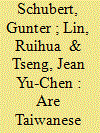

|
|
|
|
|
| Summary/Abstract |
This article applies the “strategic group” concept to Taiwanese entrepreneurs (taishang), who have businesses in both Taiwan and Mainland China, to analyze their political agency in safeguarding their collective interests. Based on extensive fieldwork, the authors look at taishang collective action in both formal and informal settings to assess whether the taishang can be considered a strategic group in contemporary cross-Strait relations.
|
|
|
|
|
|
|
|
|
|
|
|
|
|
|
|
| 2 |
ID:
141094


|
|
|
|
|
| Summary/Abstract |
Debates about whether China's rise poses a threat or an opportunity for Taiwan have settled into a realist assumption that Beijing will continue to upset the balance of power and a liberal approach that believes the benefits of economic interdependence are leading to greater gains. Missing from this debate is a nuanced consideration of how Taiwan's policy elites view themselves and their position in cross-Strait relations. Taiwan's decision makers' views are deeply affected by, and interact with, factors and institutions on and beyond the island. This article offers a model of political processes – the staying power of the status quo and order of movement – as a possible route towards an explanation for Taiwan's position on cross-Strait negotiations. The conclusion is that the status quo position – de facto but not de jure independence – is becoming more entrenched with time. Taiwan's colours of partisanship, Blue and Green, are blending into Aquamarine.
|
|
|
|
|
|
|
|
|
|
|
|
|
|
|
|
| 3 |
ID:
157190
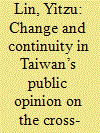

|
|
|
|
|
| Summary/Abstract |
The Sunflower Student Movement was a significant event in Taiwan’s political history. Contrary to the conventional wisdom, we argue that the effect of the movement on the attitude of the general public, particularly the young, toward the cross-Strait economic interactions and the perception that Taiwan may be forced to make political concessions resulting from such ties is limited. Based on the Taiwan National Security surveys, we find out that the movement, to a certain extent, reflected public sentiment already existing in the society, and did not push the sentiment further. Compared to the attitude toward national identity, which is more long-lasting, the views on the cross-Strait economic ties may be more volatile, and are thus less predictable.
|
|
|
|
|
|
|
|
|
|
|
|
|
|
|
|
| 4 |
ID:
158043
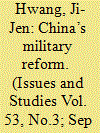

|
|
|
|
|
| Summary/Abstract |
In late 2015, the Chinese leadership announced sweeping reforms designed to bring the military into the modern era, signaling a departure from a traditional over-dependence on ground forces and incorporating extensive structural reorganization to create a more balanced joint command system. The reform aims to create a system suited to the modern conditions of informatization, with direct leadership from the Central Military Commission, and is bolstered by the Chinese military’s advancement in progressive information technology, space technology, and cyber security. With the creation of a new Strategic Support Force (SSF), China has clearly demarcated the operational command of traditional and non-traditional warfare within the military system, representing a strategic and tactical step forward that gives greater scope to the People’s Liberation Army (PLA) to dominate in non-traditional military theaters. While the military reform has the potential to affect military strategy around Asia and further afield, the extent of China’s deep and far-reaching military reform, with a view to consolidating military capabilities under a joint command and giving full rein to non-traditional warfare under conditions of informatization, represents a particularly significant factor in the stability of cross-strait relations and security. This study will outline the creation of the SSF under the new reform, and discuss the development of China’s strategy and tactics for non-traditional warfare under conditions of informatization. The implications of the military reform will then be put into the cross-strait context, in order to draw conclusions concerning the potential impact on cross-strait security.
|
|
|
|
|
|
|
|
|
|
|
|
|
|
|
|
| 5 |
ID:
076236
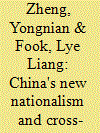

|
|
|
| 6 |
ID:
086457
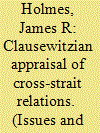

|
|
|
|
|
| Publication |
2008.
|
| Summary/Abstract |
This article uses the strategic theory of Carl von Clausewitz to analyze how the 2008 elections in Taiwan and the United States may influence cross-Strait relations. The elections will affect governments, citizens, and armed forces, and thus the value Taiwan and the United States attach to preserving the island's de facto independence from the mainland. Surveying likely interactions across the Taiwan Strait, it is hard to avoid the conclusion that the China-Taiwan-U.S. strategic triangle includes one power, China, whose Clausewitzian "trinity" remains uniformly locked on eventual unification with Taiwan and whose patience is finite; a second, Taiwan, whose government and people are ambivalent and whose military preparations are lagging; and a third, the United States, whose government and people have priorities that do not include a clash with China, whose military is shrinking, and whose officer corps wants to avoid fighting in the Strait. This mismatch in political commitments and capabilities suggests that, far from bringing about an enduring rapprochement, the elections have done little to dispel potential conflict in East Asia.
|
|
|
|
|
|
|
|
|
|
|
|
|
|
|
|
| 7 |
ID:
106244


|
|
|
|
|
| Publication |
2010.
|
| Summary/Abstract |
A comparison of the German and Chinese cases clearly shows their differences and parallels. In Germany, despite confrontation between the Federal Republic of Germany and the German Democratic Republic, they were still able to work out a modus vivendi and interact with each other. This kind of "agree to disagree" compromisemust be based on goodwill on both sides and a favorable international environment. In spite of all the parallels with the German case, Beijing is still concerned about Taiwan separatism, the sustainability of the rule of the Kuomintang, and the possible reaction of the United States to cross-Strait rapprochement. Therefore, "constructive ambiguity" based on the 1992 Consensus has to serve as an interim structure before a peace accord can be signed.
|
|
|
|
|
|
|
|
|
|
|
|
|
|
|
|
| 8 |
ID:
173979
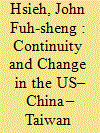

|
|
|
|
|
| Summary/Abstract |
The relations between China and Taiwan (cross-Strait relations) have been a thorny issue for all parties concerned. These relations are one of the flashpoints in the world, which may trigger a serious military conflict. They involve not only China and Taiwan but also the United States. The purpose of this paper is to account for the trajectory of this triangular relationship with the help of opinion surveys in Taiwan. It is shown that when the Kuomintang (KMT) gains the governing power in Taiwan, Taiwan is the median voter in the cross-Strait relations game at the international level while as a non-traditional KMT or the Democratic Progressive Party is in power, it is the US that turns out to be the median voter.
|
|
|
|
|
|
|
|
|
|
|
|
|
|
|
|
| 9 |
ID:
100978
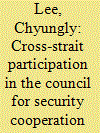

|
|
|
| 10 |
ID:
103100
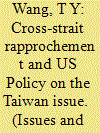

|
|
|
| 11 |
ID:
154228
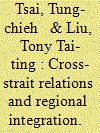

|
|
|
|
|
| Summary/Abstract |
Despite the signing of the Economic Cooperation Framework Agreement (ECFA) between mainland China and Taiwan in 2010, Taiwan’s future status in the field of Asian regional integration remains unclear. While Taiwan remains outside the Trans-Pacific Partnership (TPP) and the Regional Comprehensive Economic Partnership (RCEP), China’s rise and continued expansion in regional integration put increasing pressure on Taiwan to confront its political differences with China. This paper discusses the interconnection between regional integration and cross-Strait relations and seeks to address the implications such linkage entails. The authors note the exploitation of a two-pronged strategy by Beijing to pressure Taibei into confronting the political problem between China and Taiwan. In addition, the authors assess Taiwan’s performance in terms of its progress in the establishment of preferential trade agreements (PTAs) from 2008 to 2016 under the Ma Ying-jeou (Ma Yingjiu) administration and identify the hurdles and prospects for Taiwan’s future integration efforts. This paper concludes with a brief consideration of Taiwan’s New Southward Policy.
|
|
|
|
|
|
|
|
|
|
|
|
|
|
|
|
| 12 |
ID:
191951


|
|
|
|
|
| Summary/Abstract |
The cross-strait relations between Taiwan and China are critical in the Asia Pacific and the world. This study focuses on economic relations and their implications. The main conclusions include: First, the economic gap in output is increasingly larger, thus favouring China. Based on a time series robust least squares model, this study finds that this economic strength will significantly reduce the number of Taiwan’s foreign allies. At the same time, this economic strength also brings military imbalance. Second, by employing the Granger causality tests to examine the causality relations between the stock markets of Taiwan and China, which reflect the economic integrations in areas such as the trade of goods and services and capital flow, this study finds that China is in a dominant position. At the same time, Taiwan is in a dominated position. However, except for tourism, the effects of China’s dominant position as leverage seem limited.
|
|
|
|
|
|
|
|
|
|
|
|
|
|
|
|
| 13 |
ID:
092260


|
|
|
|
|
| Publication |
2009.
|
| Summary/Abstract |
Much has been written on the triangular, and increasingly high-profile, China-Taiwan-US relations. However, scholars have yet to apply Diversionary Theory to the China-Taiwan dyad. DT argues that leaders may resort to international conflict when domestic political and economic situations become troublesome, aiming at directing public attention away from problems at home. While creation of explicit military conflict in the Taiwan Strait by Taipei is deemed quite unlikely, more subtle processes of diversion might be expected instead. This article applies a variant on DT to assess whether leaders in Taipei have used rhetoric about Taiwan independence or unification as a distraction from domestic problems during the years leading up to Taiwan's 2004 presidential election. We find that, as the president's approval sinks, pro-independence rhetoric becomes more likely. Overall, the results of this study confirm extension of DT to the case of Taiwan and encourage further research applied to middle powers.
|
|
|
|
|
|
|
|
|
|
|
|
|
|
|
|
| 14 |
ID:
173978
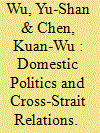

|
|
|
|
|
| Summary/Abstract |
This study examines the association between political competition (elections in Taiwan and political successions in China) and cross-Strait conflicts. We find that the Taiwan president has been more assertive toward mainland China during the election period or in his second term, than during the inter-electoral period or in the first term. The general secretary of the Chinese Communist Party (CCP) reacts to Taiwan’s provocations more harshly when he was in a period of power transition than when he had consolidated power. The two phenomena rest on the same assumption: when a political leader is domestically challenged, he cannot appear weak in external behaviors; when the leader is secure in his position, he can afford to make external concessions. We test the assumption against the empirical evidence from the cross-Strait relations of 1989–2012 and find the most serious conflicts occurred during Taiwan’s electoral period and when the CCP general secretary was in power transition. The study advances our understanding of how conflicts occur in cross-Strait relations and may lead to possible ways of their prevention.
|
|
|
|
|
|
|
|
|
|
|
|
|
|
|
|
| 15 |
ID:
069150
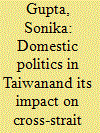

|
|
|
| 16 |
ID:
106245
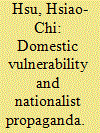

|
|
|
|
|
| Publication |
2011.
|
| Summary/Abstract |
In early 2006, President Chen Shui-bian of Taiwan surprised domestic and international audiences by announcing his intention to scrap the symbolically important National Unification Council (NUC) and the Guidelines for National Unification (GNU). This announcement not only invited strong criticism from Beijing, but also seriously strained U.S.-Taiwan relations, because it was a clear violation of Chen's 2000 inaugural pledge regarding cross-Strait policy. This policy proposal presented an important theoretical challenge to the broadly recognized election cycle model in Taiwan's mainland policymaking- unlike Chen's earlier nationalist propaganda, the NUC initiative came after instead of during a major election campaign. To address this anomaly, this paper argues that while domestic politics play a key role in Taiwan's mainland policymaking, gaining votes is not the state leader's only concern. A careful examination of the political context shows that Chen's NUC campaign was used to divert attention from his personal political crisis following on his loss of both control over policy and leadership over his party after the DPP's poor showing in the December 2005 elections for city mayors and county magistrates.
|
|
|
|
|
|
|
|
|
|
|
|
|
|
|
|
| 17 |
ID:
077671
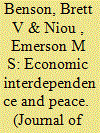

|
|
|
|
|
| Publication |
2007.
|
| Summary/Abstract |
Most of the contemporary policy debate regarding economic interdependence and peace has focused on devising responses either in favor of or in opposition to the prevailing notion that trade is positively and unconditionally correlated with peace. The China and Taiwan case-noteworthy for the simultaneous presence of an ever-increasing economic interdependence and an adversarial political relationship-provides an interesting counter-example to the leading positions in the literature. What is missing in the literature is a model that studies states' decisions to trade and initiate conflict as a function not only of their own utility but also of their perceptions about how their opponent will respond. States' decisions to trade depend on the likelihood that their prospective trade partner will initiate a conflict, and decisions to initiate a conflict depend on perceptions of the likelihood that the target will concede. In this article, the authors develop a model that expands the domain of the trade-peace analysis by endogenizing and analyzing states' decisions to trade and initiate conflicts
|
|
|
|
|
|
|
|
|
|
|
|
|
|
|
|
| 18 |
ID:
064436
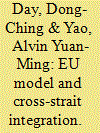

|
|
|
| 19 |
ID:
102761
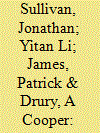

|
|
|
| 20 |
ID:
173977
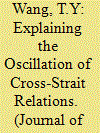

|
|
|
|
|
| Summary/Abstract |
This special section includes four papers to examine the ups and downs of the relationship between Taiwan and China. While both sides of the Taiwan Strait have different political systems, these studies show that domestic politics play a central role in explaining the oscillation of the cross-Strait relationship. The findings provide evidence of the interaction between domestic and external factors. Leaders in Beijing and Taipei therefore need to take heed of the internal forces of both sides of the Taiwan Strait in addressing their contentious relationship.
|
|
|
|
|
|
|
|
|
|
|
|
|
|
|
|
|
|
|
|
|